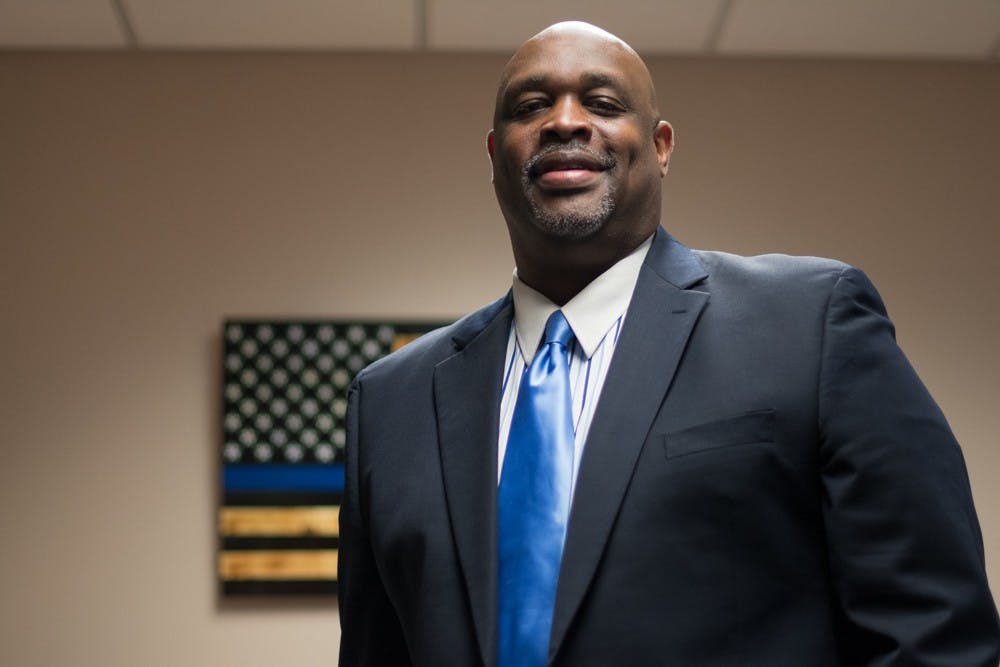David L. Perry has served as the new assistant vice chancellor and chief of UNC Police since Sept. 3, following the resignation of former UNC Police Chief Jeff McCracken. Perry comes to the University after having served as police chief at Florida State University for 14 years.
Following Perry’s first couple weeks at the University, assistant University desk editor Evely Forte sat down with him to discuss how he’s hoping to build up missing trust between campus community members and his police force, as well as his vision for ensuring safety on campus during his time at UNC.
The Daily Tar Heel: Can you elaborate a bit on your background and experiences in community policing, specifically before your time at FSU?
David Perry: I think my community policing started when I became an Albany police officer back in 1993. I literally had to walk a beat — I had to walk a downtown area. I was instructed by my supervisors to get to know the people within that beat — talk to business owners and meet people. And I was a cool. I thought I was getting paid to go out and have good social interactions, but then he also said, ‘When crime occurs within your area, you have to be ready to respond, and hopefully you’ll meet people, and they’ll give you information where you can maybe prevent crime.’ So, I thought that was really cool at a young age to just talk to people, meet with them and then, hopefully, use them as allies to help reduce crime and just make that, my little zone, a safer place. So, that’s when community policing started for me and started in my mind.
And that transitioned into every assignment that I’ve really had because when I left being a patrol officer, as a drug task force agent, I was specific to drug investigations and drug crime, but I was still community oriented. It was helpful for communities to see we were removing people who were selling drugs in their community. It was helpful to go and talk to the elderly or people who were really concerned about loitering and people standing around about what we need to do and what times are good to come back. So, even though it was not a pretty scene, when you’re dealing with drug investigations, it was very fulfilling work to see that you could make a difference in a barrier cleaning up drugs and crime.
Those community connections continued as I accepted a position at Albany State, a Historically Black University (HBCU). Again, getting to know the university, getting to know the people, the administration, the students and working together to be successful. So those same types of approaches have worked at Clemson University, very, very successful at Florida State, and I hope to bring some of those same ideas, same energy and same commitment to community policing here.
DTH: I know mistrust on campus between University students and campus police is something that has been on the rise lately. Is there anything that you have in mind – or that you would like to accomplish while here – that would tackle that or that would try to diminish that sort of mistrust that seems to already exist in our campus culture here?
DP: Yeah, and campus culture here, I understand there have been past challenges. But I am coming in, hopefully, with this mindset for all, that we are hoping to wipe the slate clean and start over, because I am completely different from the previous administration. There has never, ever been a police chief here like me, and so I am going to use that as a good thing. But it first starts with the men and women within the department – getting them to understand what my expectations are, having a sense of urgency, providing outstanding customer service and being present and visible for the people that we serve.
I’m working, from day one, to try and change the culture and the mindset of the men and women that work here, so then we can go out, and people can start to feel some of those changes and see like, ‘Hey, they are really taking their time. The officers are here. They’re not here to spy on us. They’re here just to say hello, or they’re walking through our events.’ Just to start to change some of those past ideas about some of the interactions that police and students have had.




